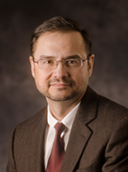CHICAGO--Now that it's in the process of swapping its commercialized cancer drugs to Novartis ($NVS) in exchange for a portfolio of vaccines, GlaxoSmithKline's ($GSK) oncology division is retooling and adding a new focus on the emerging field of T-cell engineering in immuno-oncology. And in the process the pharma giant is sending a clear message that it still sees a bright future for itself in cancer drug research.
The pharma giant announced this morning that it's partnering with investigators at Oxford, U.K.-based Adaptimmune on genetically tailoring T-cell receptors (TCRs), a field closely related to the celebrated CAR-T drugs now in development at Novartis and Juno Therapeutics.
 |
| Adaptimmune CEO James Noble |
In the deal, GlaxoSmithKline has agreed to pay $350 million-plus over time for successful work in developing new cancer drugs. GSK is also co-developing Adaptimmune's lead program targeting the cancer testis antigen NY-ESO-1, with an option on the program that runs through clinical proof-of-concept, expected in about 18 months. The companies are staying mum for now about the upfront, but Adaptimmune CEO James Noble emphasizes that the money is earmarked for near-term support to help fund their work over the next 7 years, while the relationship and cash flow are expected to last much longer.
GSK execs also signaled their enthusiasm for the deal.
 |
| GSK chief of immuno-oncology Axel Hoos |
"We believe that the Adaptimmune technologies are the best technologies for TCRs," says Axel Hoos, who runs GlaxoSmithKline's immuno-oncology R&D group.
In CAR-T, investigators are adding a chimeric antigen receptor to the surface of T cells extracted from patients, using an antibody fragment to reengineer them as cancer fighters. But given the limited number of surface targets, Hoos says, CAR-T programs are already looking fairly crowded, with the pioneers focusing on CD-19 as a favorite target.
"CARs are one step ahead," Hoos says. But TCRs could catch up quickly. With TCRs developers can also go after a "universe of intracellular targets," he adds. GSK is building a dedicated team to work with Adaptimmune on next-gen targets, which considerably outnumber CARs.
"We believe we can drive this fast and efficiently," says Hoos.
He's not going to get an argument on that score from Noble, who now has his first Big Pharma deal for Adaptimmune, which started out in 2008 as a virtual company with a couple of staffers and a relationship with Carl June at the University of Pennsylvania, who's now focused on the Novartis program. Noble says the deal is also probably his last Big Pharma collaboration for some time, as it sets up both groups to work together while developing their own pipelines.
"It's putting the two of us together," says Noble about the collaboration with GSK.
T-cell research like this is unfolding in a fundamentally different way than you see in most other areas of drug investigation. Researchers have understood for some time now that even small trials--like the ones Adaptimmune is now running in ovarian cancer, myeloma, melanoma and sarcoma solid tumors--can deliver a clear indication of whether the therapy is working. Investigators are looking for a major impact on cancer among many of the patients, like the 13 of 17 myeloma patients who responded in an earlier study.
Adaptimmune's new partnership gives it top billing in the field, which also includes Juno Therapeutics, a T-cell group working on CARs as well as TCRs. Kite Therapeutics came out of nowhere in recent months, raising a considerable amount of venture cash and then quickly filing for an IPO to back a combined CAR-T/TCR effort.
 |
| GSK SVP of Oncology R&D Dr. Rafael Amado |
GSK's oncology group is in an extraordinarily unusual position. About 350 staffers working in the R&D side of the business will be in transition as Novartis assumes responsibility for GSK's commercial oncology portfolio, says Rafael Amado, GSK's cancer drug research chief. The remaining group will be focused on immuno-oncology and epigenetics (there's a deal with Epizyme in place) as well as tumor signaling. Novartis will have the right of first refusal on anything it likes in the pipeline, though GSK is not obligated to accept the terms and is free to develop and commercialize what it likes.
To do that, though, GSK would also have to rebuild a commercial oncology team--and the pharma giant isn't ruling that out.